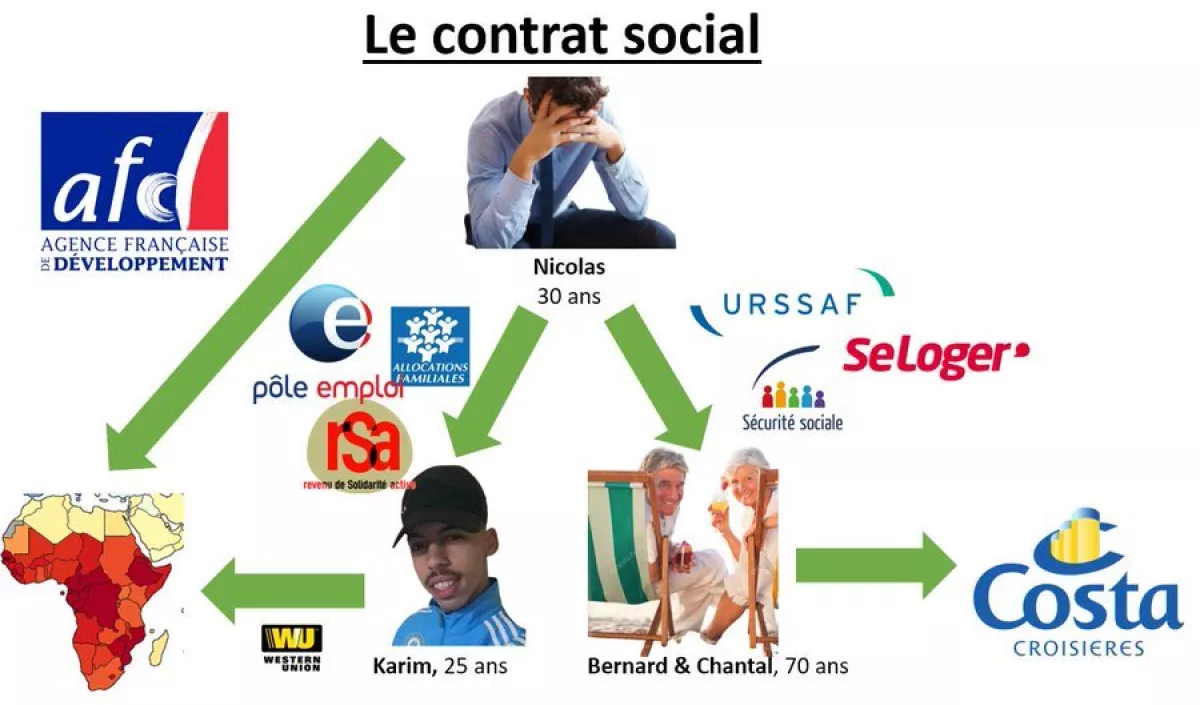Anti-tax movement puts Macron under pressure ahead of unpopular budget cuts
A powerful anti-tax sentiment is spreading rapidly online in France, putting President Emmanuel Macron’s administration on edge as it braces for a potentially explosive budget battle this autumn.
The slogan “Nicolas qui paie” (“Nicolas picks up the tab”) has become a rallying call for white-collar workers who feel they are being forced to shoulder an unfair tax burden to sustain a faltering welfare system.
According to an article by Politico looking into the emerging movement, it comes at a sensitive political time as Macron’s centrist bloc is under pressure and Marine Le Pen’s National Rally preparing for a strong run at the presidency in 2027.
From Meme to political symbol
The figure of “Nicolas” is often traced back to a provocative meme that circulated in 2020, portraying a weary, 30-year-old middle-class worker with his head in his hands. The image implied he was paying for pensioners “Chantal and Bernard” to enjoy cruises, while also funding welfare for 25-year-old “Karim” and supporting aid to Africa, with the latter leaving a bitter taste of xenophobic sentiment.

Since then, the image of Nicolas has been adopted more widely in France’s political debate. The magazine raises the question whether Le Pen can attract votes from this disgruntled group, which has generally seen her policies as favouring the older “Chantal and Bernard” generation rather than their own.
According to figures from the monitoring agency Visibrain, more than 503,000 tweets about the “Nicolas qui paie” trend have been posted since the beginning of the year, with activity spiking sharply since June.
Nicolas — a name common among French boys born in the 1980s — has come to symbolize the anger of middle-class households, according to the article, which are considered too “wealthy” to qualify for benefits, but not wealthy enough to escape the pressure of rising taxes. In some corners, the slogan has taken on a darker edge, with certain posts accusing immigrants of draining France’s welfare system.
Elysée on high alert
The trend has grown so large that it is now being closely watched by Macron’s office. “We’re paying attention to movements such as ‘Nicolas qui paie’,” said an adviser from the Elysée, who requested anonymity due to protocol.
“It can be seen either as a populist far-right movement or a warning sign that the people’s acceptance of taxes is wearing thin,” he said. “We think it’s both, and a sign that taxes mustn’t go up.”
What began on the margins of extreme-right circles has now entered mainstream discourse. Pollster Bruno Jeanbart of OpinionWay warned that Macron’s team has cause for alarm: “They know it is reaching the heart of their electorate, successful young people who believe in putting a lot of effort into work, and who voted Macron.”
Unpleasant déjà vu
The moment is particularly delicate given Prime Minister François Bayrou’s upcoming 2026 budget, which aims to save €44 billion through spending cuts and new levies. Among the most controversial measures under discussion is the removal of two of France’s 11 public holidays.
For Macron, the “Nicolas qui paie” wave recalls the grassroots Yellow Vest revolt of 2018–2019. That tax-driven uprising began on Facebook and escalated into weeks of unrest that forced Macron into rare retreats, scrapping a planned fuel tax and reversing an unpopular pensioner levy. Ironically, those concessions directly reflected the kinds of measures that today’s disillusioned “Nicolas” generation might have welcomed.
Authorities are also concerned about online calls urging protesters to “shut down the country” on September 10, which are gaining traction across anti-Macron networks.
Cracks within government deepen
The momentum behind “Nicolas” is already prompting divisions inside Macron’s camp. Interior Minister Bruno Retailleau, known for his hardline stance, attacked Bayrou’s draft budget last month and pledged to propose measures to increase incomes. Otherwise, he warned, “Nicolas will keep on paying.”
Opposition figures are also seizing on the meme. In June, conservative firebrand Éric Ciotti quipped that “it doesn’t matter” that the Paris Olympic Games went vastly over budget, because “it’s Nicolas who is picking up the tab.”
For Jeanbart, the pollster, the real question is whether this anger signals a deeper political shift. “The movement could mark younger, middle-income voters drifting away from traditional parties,” he said, “and possibly toward far-right groups, including Le Pen’s National Rally.”
By Nazrin Sadigova








